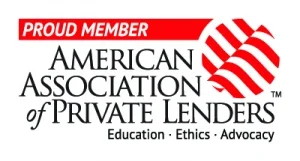Ever thought getting a loan for a rental property is harder than a personal mortgage? It’s true. Rental property financing has its own rules. This guide will show you how to get a loan for a rental property. It’s key for those wanting to invest in real estate.

Key Takeaways
- The typical down payment for rental property loans ranges between 20-25%.
- Credit score requirements start at 640 or above.
- The debt-to-income ratio should ideally be below 36%.
- Interest rates for rental property loans are generally 0.5% to 0.875% higher than conventional mortgages.
- Up to 10 mortgages may be allowed by some lenders for investment properties.
- Conventional bank loans for investment properties typically demand higher down payments of 30% or more.
Introduction to Rental Property Loans
Understanding rental property loans is key for those wanting to grow their investment portfolio with real estate. These loans help investors buy properties for rent or to increase their value. This way, they can earn rental income or see the property’s value go up.
Definition and Importance
Rental property loans are a special kind of real estate investment loan. They give investors the money they need to buy properties for rent. These loans are important because they let investors start in the real estate market without paying the full price upfront. This support can lead to big profits.
Types of Rental Property Loans
- Conventional Loans: They usually have higher interest rates than loans for primary homes but are still competitive.
- VA Loans: These can finance up to four-unit properties. The borrower must live there and rent out the others. Short-term rentals are not allowed.
- FHA Loans: First for primary homes, they can later finance properties with up to four units. They offer low down payments and allow for multi-unit purchases.
- Portfolio Loans: Banks offer these loans, tailored to the investor’s needs. They require a detailed credit check.
- Commercial Loans: For big investments like multi-family buildings or commercial properties. They need a big down payment and strict qualifications.
There are also other loan types like bank statement loans, asset-based loans, and private money loans (like hard money loans). These offer unique financing chances for real estate investors.
Knowing the different investment property financing options helps investors pick the best loan for their needs. This smart choice can help them manage and grow their real estate investments better.
How to Get a Loan for a Rental Property
Starting your journey to own a rental property means learning about your loan choices. It’s key to know the different types of loans for rental properties. These loans help you grow your investment and meet all the needed requirements.
Understanding Loan Options
When looking for a loan for a rental property, consider these options:
- Conventional Loans: These loans are popular among investors. They need a credit score of at least 620 and down payments of 20% to 25%.
- FHA Loans: These loans have lower down payments and are easier to get. They’re great for more investors.
- VA Loans: Only for veterans, active-duty service members, and their spouses. These loans offer special benefits.
- Portfolio Loans: Perfect for investors with many properties. They can be customized but often have higher interest rates.
- Commercial Loans: For properties that will rent to businesses, not homes.
Knowing these options helps investors pick the best mortgage for their goals and strategies.
Loan Application Process
The loan application for rental properties needs detailed financial info. To succeed, follow these steps:
- Check Your Credit Score: Lenders want a score of 620 or higher. A score of 700 or above can get you better rates.
- Save for a Down Payment: Conventional loans need 20% down. FHA loans might need less.
- Gather Financial Documents: Get tax returns, bank statements, and income proof. This shows you can repay the loan.
- Calculate Debt-to-Income Ratio: Keep your DTI ratio under 36%. Lenders check this to see if you can handle more debt.
- Present Rental Income: If you have rental income, show it. It can help your application.
Being ready with these details makes the process smoother. It also boosts your chances of getting a loan that fits your needs.
In summary, getting a mortgage for rental properties needs careful planning. Knowing the different loans and how to apply for them helps investors confidently find good investment opportunities.
Requirements for Rental Property Loans
To get landlord loans for rental properties, you need to meet certain criteria. These show you’re financially stable and serious about investing. You’ll need a good credit score, a big down payment, and a low debt-to-income ratio. Let’s look at these key requirements for a rental property loan.
Credit Score Requirements
The credit score is very important for rental loan applications. Most lenders want a minimum score of 680 if you put down 15%. But, if you can put down 25%, the score can be as low as 620. A good credit history helps you get approved and can even get you better interest rates.
Down Payment Requirements
Lenders usually ask for a down payment of 15% to 20% of the property’s price. Putting down 25% or more can make your loan terms better. This shows you’re a reliable investor.
Debt-to-Income Ratio
The debt-to-income ratio (DTI) is also crucial. Your non-housing debts should be less than 28% of your monthly income. Your total debts, including housing, should not go over 36%. Keeping your DTI low shows you can handle more debt.
Types of Loans Available for Rental Properties
Investing in rental properties can be very profitable. But, picking the right loan is key. Different loans meet different needs and strategies. Here’s a look at the main types of loans for rental properties.
Conventional Loans
Conventional real estate loans are popular. They allow for various property types. You need a down payment of at least 20% and cash reserves for six months of mortgage payments.
Lenders want a credit score of 620 or higher. They also check your debt-to-income ratio, which should not be over 36%.
FHA Loans
FHA rental property loans are great for new investors. They require a down payment as low as 3.5%. You also need a lower credit score and can have a higher debt-to-income ratio.
But, you must live in one of the property’s units. This is a big requirement.
VA Loans
VA loans are for military service members. They offer no down payment, lower interest rates, and lower closing costs. You must live in at least one unit of the property.
VA loans can finance up to seven units. This is a great choice for eligible veterans.
Portfolio Loans
Portfolio lending is flexible. Lenders keep the loan themselves, not selling it. This means more flexible terms based on your credit and the property’s income potential.
These loans work for unique investment plans and property types.
Commercial Loans
Commercial property financing is for big investments like multi-unit buildings. These loans have stricter criteria. You need a higher credit score, a lower debt-to-income ratio, and more cash reserves.
Commercial loans have higher interest rates. This is because they’re riskier for lenders.
Choosing the right loan is vital for success. Each loan has its own benefits and rules. Think about your finances and goals to pick the best loan for you.
Strategies for Securing Financing
Getting a rental property requires smart financing strategies. It’s important to compare lenders and their rates to get the best deal. Looking into alternative financing for rental properties can also help. And, improving your chances of loan approval is key.
Comparing Lenders and Rates
When you invest in rental properties, start by comparing lenders and their rates. In California, you might need to put down 20% to 25% of the property’s value. But, some loans from Fannie Mae and Freddie Mac might only require 15% down.
To get a good deal, aim for a high credit score. A score of 700 or above can help you qualify for lower down payments. Also, keep your debt-to-income ratio between 36% and 45% to meet lender preferences.
Exploring Alternative Financing
Looking into alternative financing for rental properties can be beneficial. Hard money loans focus on the property’s value, not your credit score. Private lenders offer flexible terms and quick approvals.
Other options include seller financing and group investing. Private lenders can create repayment plans that fit your needs. This might include interest-only payments or balloon payments.
Improving Loan Approval Chances
To boost your loan approval chances, work on your credit score and reduce debts. Lenders want a credit score of at least 640. But, a higher score can get you better terms.
Having enough cash for six months of mortgage payments is also important. This shows lenders you’re financially stable. Make sure all your financial documents are complete and up-to-date. This can help speed up the approval process and get you better loan terms.
Investment Property Financing Options
Securing financing for investment properties is crucial. There are many property investment loans available. Each loan is designed for different investor needs and goals. You can choose from conventional loans, portfolio loans, and specialized programs like Fannie Mae and Freddie Mac.
Fannie Mae and Freddie Mac are key players in real estate financing. Fannie Mae lets investors finance up to 10 properties. But, there are some rules to follow:
- Minimum credit score of 720
- 25% down payment for 1-unit properties, and 30% for two 4-unit properties
- 6 months reserves for each loan
- No delinquencies of 30 days or greater within the past 12 months on any mortgage loan
- No bankruptcies or foreclosures within the past 7 years
Freddie Mac also has its own investment property mortgage program. Here are the requirements:
- No more than 10 home loans on properties with one to four units
- Minimum credit score of 720 for borrowers with more than six financed properties
- 15% down payment for 1-unit properties, and 25% for two 4-unit properties
- 6 months reserves for each property
- Maximum debt-to-income ratio of 45%
Portfolio loans are an option for financing more than 10 properties. These loans are kept by banks and often have easier credit and down payment rules. But, expect higher interest rates and fees.
The down payment for an investment property loan is usually 25%. However, it can change based on your credit score. For example, great credit might only need 15% down, while poor credit could need up to 35%. Also, having 6-12 months of liquid cash reserves is important for loan approval.
Investment property mortgage rates are higher than residential loans. They range from 8% to 9.75%, compared to 6.75% for residential loans. A solid financing strategy is key to making money and growing your wealth through property investments.
Choosing the right financing option is crucial for success in property investment. Whether it’s conventional loans, specialized programs, or portfolio loans, understanding your options is vital. This knowledge helps you reach your financial goals.
Using Home Equity for Rental Property Loans
Home equity can be a great way to get loans for rental properties, especially when the market is shaky. But, it’s important to know the differences between home equity loans, Home Equity Lines of Credit (HELOCs), and cash-out refinancing. Let’s look at each option to see how they work and what benefits they offer.
Home Equity Loans
Home equity loans are a solid choice for investing in properties. They let you borrow against your home’s value for a fixed amount at a set interest rate. This means you’ll have the same monthly payment every month.
But, with interest rates going up in 2023, it’s more important than ever to plan your budget carefully. These loans can be a good choice because of their fixed rates. Yet, if you can’t pay them back, you could lose your home. It’s key to manage your investments well, especially when the market is changing.
HELOCs
HELOCs offer flexibility with their variable rates. You can use the credit as needed during a draw period, and then pay it back during a repayment term. The interest-only payments during the draw period make it a good choice for ongoing investments.
With rising interest rates, HELOCs might be more appealing than fixed loans if you want to invest in multiple properties. But, because the rates can change, you need to really understand the market and your financial situation.
Cash-Out Refinances
Cash-out refinancing lets you tap into your home’s equity for a big investment in real estate. By refinancing your mortgage for more than you owe, you get the extra money to buy rental properties. This option can be very powerful.
But, it comes with costs like closing fees and higher interest rates than usual refinancing. With recent market changes, it’s crucial to do a deep dive into the market to make sure you’ll make money after all expenses are considered.
In summary, home equity loans, HELOCs, and cash-out refinancing each have their own benefits for financing rental properties. But, they all require careful planning and a good grasp of the market, credit needs, and how to pay back the loan.
Understanding Loan Terms and Conditions
It’s key to understanding loan terms and conditions for a good investment. Knowing these details helps make smart financial choices.
Fixed-Rate vs. Adjustable-Rate Mortgages
Choosing between a fixed-rate rental loan or an adjustable-rate mortgage (ARM) is important. A fixed-rate loan means steady payments, making budgeting easier. On the other hand, an ARM might start with a lower rate, saving money upfront. But, it could lead to higher payments later due to rate changes.
Loan Terms and Repayment Schedules
Loan terms for rental properties can last from 15 to 30 years. It’s vital to know the loan repayment for investment property to match your investment plan. Lenders often look for a debt service coverage ratio (DSCR) of at least 1.2. This ensures rental income covers loan payments.
Also, lenders want to see six months of payments in liquid reserves. This helps protect against financial shocks. Properties in smaller towns or with lower values might face financing challenges. But, a good credit score and a big down payment can help.
Interest rates vary, starting around 7% for rental property loans. They can go higher.
In short, knowing the difference between fixed and adjustable-rate mortgages is crucial. Understanding your repayment terms helps create a solid investment plan. With these tips, investors can better manage their loans and achieve success in rental properties.
Rental Property Insurance and Tax Implications
As a real estate investor, knowing about rental property insurance and taxes is key. This insurance protects your property and income from unexpected events. It covers damage, liability, and lost rental income.
Importance of Rental Property Insurance
Rental property insurance is vital for risk management. It covers damage, liability, and lost income. For example, it can help with storm damage costs. It also protects you from lawsuits if someone gets hurt on your property.
With this insurance, you can grow your real estate without worry. It safeguards your assets and income.
Tax Deductions and Benefits
Taxes are another crucial aspect of rental properties. You can deduct many things, like mortgage interest and property taxes. You can also deduct repairs, utilities, and insurance.
Strategies like 1031 exchanges can help you avoid capital gains taxes. This can save you a lot of money. Using these tax benefits can greatly improve your investment returns.
Understanding rental property investments is complex. It’s not just about the purchase price and rental income. You need to consider operating expenses, which can be 35% to 80% of your income.
Knowing about insurance and tax deductions is essential. For more information on loans and financial strategies, check out Tidal Loans. They provide quick and efficient loan options.


